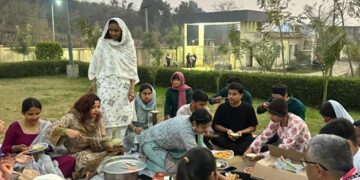By: RAYEES AHMAD KUMAR
The valley of Kashmir is famous for the enchanting beauty, mesmerizing climate and also for being the abode of Reshi’s and Sufis. Besides this it has given birth to a number of world renowned scholars and litterateurs of global reputation. Baba Dawood Khaki, Sheikh YaqubSarfi, Molana Anwar Shah Kashmiri, Gani Kashmiri, PeerzadaGhulam Ahmad Mehjooretc are some of the legendary scholastic figures valley has given birth to. Poets, authors, critics and researchers of valley have been successful in gaining popularity and reputation both within the country and around the globe.
Among these noted writers, MaqboolFerozi is a prominent name who has expertise on Islamic Mysticism and has authored many books related to Sufism. Hailing from FerozporaRafiabad area of Baramulla district, MohdMaqbool Dar alias MaqboolFerozi is a retired Civil Services officer. He has pursued his post-graduation in Persian through Kashmir University and later went to Iran to complete his M.Phill. He writes articles and essays on varied subjects including History, Sufism, Social and cultural aspects of society.
His articles and essays are widely hailed by his readers. Till date he has written hundreds of such articles and essays and finally compiled them into a collection. This collection of 129 articles “BargiZarin” is published by GNK publications Kashmir. It is spread over 348 pages of superior paper quality. It’s cover page is beautifully designed.
On 23-10-2023 this collection was released in a grand literary function in the auditorium of Govt HSS Baramulla in which noted writers and poets of valley participated. Dedicating this book to his parents Maqbool is of the view that everything can be bought from the market except the mother’s immortal love.
In it’s foreword, author says that in today’s high-tech world, it is much easier to communicate with the people living in far-apart continents thus transforming the whole world into a single village. The digital technology helps us in extensive research and sharing our ideas and thoughts with the world. “I have shared my thoughts on Facebook and acting upon the advice of my friends and dear ones, finally decided to make it a collection”.
KhamoshiGuftaguHai (p13) is the opening essay of the book in which the author has highlighted the benefits and blessings of silence. He has quoted couple of Persian and Urdu couplets to prove his statement including ‘Ilmkiibtidahaihungama, Ilmkiintihahaikhamoshi’. (The beginning of acquiring knowledge is tumultuous but the end is wise silence)
In the chapter- ‘Islam Aur Kashmir’- the author suggests that Islam spread here largely due to noble efforts of Bulbul Shah and Mir Syed Ali Hamadani (RA). But when we analyse different historical books especially the one written by Kalhana (Raj Tarangni) it comes to fore that Islam had spread its roots much earlier during the 8th and 9th century. Sultan Mahmud Gori also attacked, thrice, to convert non-Muslims to Islam and those who denied were killed. Once he offered the Zuhar prayer in famous temple on Suliman hill at Srinagar.
Traders, soldiers and tourists have played a pivotal role in spreading the noble teachings of Islam in Kashmir. Maqbool Ferozi has quoted a number of Dr Iqbal’s Urdu and Persian couplets in which he reiterates that instead of loving this mortal materialistic world we must be anxious about the better rewards in hereafter. He just translates the Quranic message in his poetry. In ‘Maazikemoukhe se’, MaqboolFerozi writes about his past golden days of Iran when he would study there at Tehran University during 1972-80. The only thing which displeased him there, was their negligence of religious duties and unbridled wine trade.
About divine knowledge and Sufi mystics, MaqboolFerozi has written a detailed piece “ilmludiniaurkhirkaposhi” (p456), in which he elaborates the virtues and qualities of a mystic and argues that it mysticism isn’t gained through traditional sources of knowledge but is acquired by pleasing almighty who bestows certain qualities to such pious people.
SuhbatiSoleh (p51)- This write-up focuses on the company one should adopt to reap the benefits for life. Moulana Rumi and Dr Iqbal both have strongly recommended pious and virtuous company. In fact one is known by the company of his friends. Thus he must prefer the company of good and God fearing people only.
When MaqboolFerozi was pursuing his P.hD at Tehran University in 1977, he once intended to return back home via Pishawar Rawalpindi to meet his uncle. Suddenly a calamity struck as the plane was about to crash. All the passengers on board were hapless and were certain to die within seconds. He too had lost his hopes. A Srilankan passenger was repeatedly requesting him for the prayers. This melancholy lasted for about ten minutes and the mishap was averted only after the pilot announced “Attention please- We are out of danger, thank God everything is OK now”.
In the chapter ‘Pir Rumi murshidRoshanzamir’ (p79), the writer talks about Moulana Rumi and describes him as the name of a multidisciplinary and multidimensional personality who has moulded the minds of millions of people through his poetry, writings and sermons. He is one of the great spiritual guides who mentored thousands of people who have attained spiritual glory. Dr Iqbal too considers him as his spiritual mentor.
The writer also, time and again, in many of the essays, encourages learning other languages of the globe but at the same time we mustn’t ignore our own mother-tongue. This is our identity, cultural legacy and the language of our ancestors.
In ‘Waldainkesathhusnisalook’, The writer quotes glorious Quran and Hadith to stress on the obedience of the Allah, Prophet (SAW) and one’s parents while in ‘Dost aurdostikikahani’ focuses on the value and stature of God fearing saints. ‘Hub, Muhabbat YaIshq (p190) is written adorably by MaqboolFerozi. Quotes of Imam Ghazali, couplets of Iqbal and some Quranic verses help every reader to grasp the basic idea of about the theme.
In ‘WahdatulWajoodAurWahdatulShahood’, the writer brings forth the most debated topic of mystic scholars of the globe while trying to make a comprehensive distinction between the two thoughts one created by IbniArabi and the other one by Sheikh Ahmad Sarhandi (RA). The writer also discusses ‘AuliaiKiram’ (Friends of Allah) giving references in the sacred verses of glorious Quran, Hadith of the prophet (SAW) and sayings of the noted Islamic scholars – what their stature is and what qualities they are bestowed with. In this brief essay we find the quotes of Moulana Rumi, Data GanjShakar and Dr Iqbal mentioned by the author with the intention to inculcate love and affection with these great friends of Allah. Waging a war against these is like waging a war against Allah.
In all the 129 articles of the book we find comprehensive and simple words alongside poetic couplets making them extraordinarily beautiful. A reader feels compelled to go through all the articles as each piece depicts the writers thorough study of Dr Iqbal, Moulana Rumi, Hafiz Sheerazi and Sheikh Ahmad Sarhandi (R.A).
Writer is a columnist hailing from Qazigund Kashmir.






